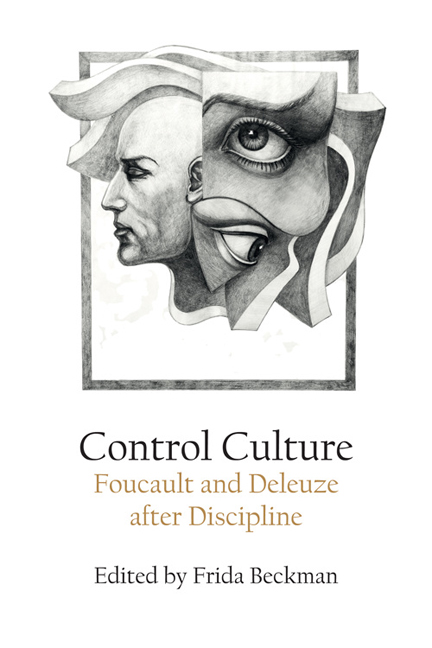Book contents
- Frontmatter
- Contents
- Acknowledgements
- Notes on Contributors
- Introduction. Control of What?
- 1 Notes from an Investigation of ‘Control Society’
- 2 Post-Mortem on Race and Control
- 3 Periodising (with) Control
- 4 Subjects of Sovereign Control and the Art of Critique in the Early Modern Period
- 5 Posthumanism, Social Complexity and the Political: A Genealogy for Foucault’s The Birth of Biopolitics
- 6 ‘That Path is for Your Steps Alone’: Popular Music, Neoliberalism and Biopolitics
- 7 Cinema in the Age of Control
- 8 Towards a ‘Minor’ Fascism: Panoptic Control and Resistant Multiplicity in TV’s Spooks
- 9 Species States: Animal Control in Phil Klay’s ‘Redeployment’
- 10 Control and a Minor Literature
- 11 Philosophy and Control
- Index
3 - Periodising (with) Control
Published online by Cambridge University Press: 05 May 2021
- Frontmatter
- Contents
- Acknowledgements
- Notes on Contributors
- Introduction. Control of What?
- 1 Notes from an Investigation of ‘Control Society’
- 2 Post-Mortem on Race and Control
- 3 Periodising (with) Control
- 4 Subjects of Sovereign Control and the Art of Critique in the Early Modern Period
- 5 Posthumanism, Social Complexity and the Political: A Genealogy for Foucault’s The Birth of Biopolitics
- 6 ‘That Path is for Your Steps Alone’: Popular Music, Neoliberalism and Biopolitics
- 7 Cinema in the Age of Control
- 8 Towards a ‘Minor’ Fascism: Panoptic Control and Resistant Multiplicity in TV’s Spooks
- 9 Species States: Animal Control in Phil Klay’s ‘Redeployment’
- 10 Control and a Minor Literature
- 11 Philosophy and Control
- Index
Summary
What kinds of critical possibilities become legible if one reads Gilles Deleuze's conceptualisation of control societies both as a work of periodisation theory and as a theory of periodisation? In other words, how might one read the concept of control in methodological terms? Central to my attempt to respond to these questions is Fredric Jameson's observation that periodising hypotheses ‘tend to obliterate difference and to project an idea of the historical period as massive homogeneity (bounded on either side by inexplicable chronological metamorphoses and punctuation marks’ (1991: 3–4). Jameson's solution to this problem centres on the concept of the ‘cultural dominant’ that replaces the concept of style within aesthetic analysis and that thus allows for ‘the presence and coexistence of a range of different, yet subordinate, features’ (1991: 4). The specific features which Deleuze attributes to control societies suggest the possibility that this analytical rubric can be extended to the analysis of ‘dominant’ features that occur not only in spheres conventionally described in aesthetic (or stylistic) terms – such as architecture, literature and visual art – but also in arrangements that operate across and demonstrate the close imbrication of discursive and material registers: governmentality, technology and economics. A close reading of Deleuze's writings on control reveals an understanding of these co-constitutive registers that both invites and thwarts ‘clean’ periodisation. Because of this, the concept and the historical logic of control necessitate modes of analysis that can account for complex assemblages of epistemic abstractions and the concrete situations that undergird and (for worse and for better) exceed them.
It is certainly the case that a specific periodising gesture grounds the essays ‘Having an Idea in Cinema’ (1998; first delivered as a lecture at La Fémis in 1987) and ‘Postscript on Control Societies’ (1995b), as well the conversation with Antonio Negri published as ‘Control and Becoming’ (1995a; first published in 1990). Across these texts Deleuze names and sketches the contours of a sociopolitical and economic shift away from the regimes of sovereignty and discipline theorised by Michel Foucault. In the earliest of what one might call the control texts, ostensibly a commentary on the cinema of Jean-Marie Straub and Danièle Huillet, Deleuze itemises the predominant mechanism of disciplinary societies – ‘the accumulation of structures of confinement’ (prisons, hospitals, workshops and schools) – in order to demarcate a period in which emerge ‘societies of control that are defined very differently’ (1998: 17).
- Type
- Chapter
- Information
- Control CultureFoucault and Deleuze after Discipline, pp. 44 - 62Publisher: Edinburgh University PressPrint publication year: 2018

